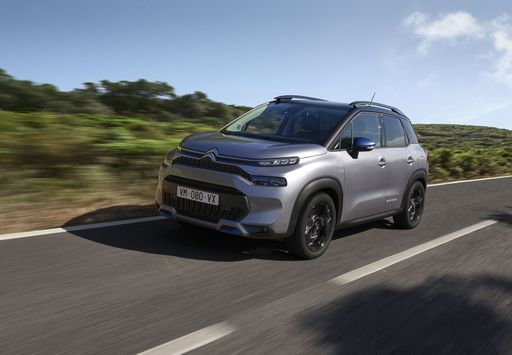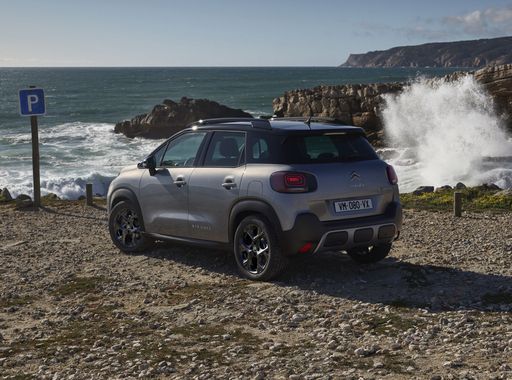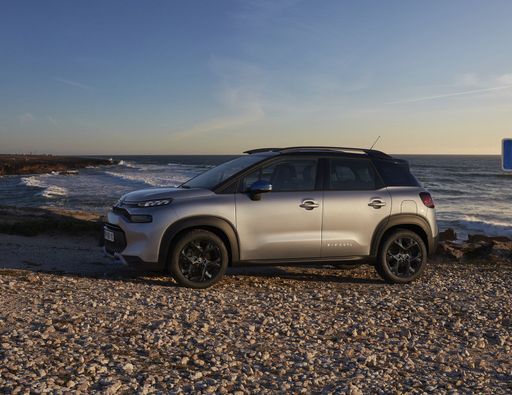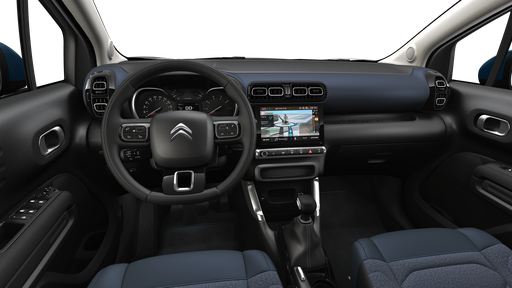Citroen C3 Aircross VS VW Transporter Transporter – Specs, Efficiency & Price Comparison
Which model is the better choice – the Citroen C3 Aircross or the VW Transporter Transporter? We compare performance (145 HP vs 286 HP), boot capacity (460 L vs ), efficiency (18.10 kWh5.60 L vs 21.90 kWh7.10 L), and of course, the price (16100 £ vs 37500 £).
Find out now which car fits your needs better!
The Citroen C3 Aircross (SUV) is powered by a Petrol, Electric or Petrol MHEV engine and comes with a Manuel or Automatic transmission. In comparison, the VW Transporter Transporter (Cargo Van) features a Diesel, Plugin Hybrid or Electric engine and a Manuel or Automatic gearbox.
When it comes to boot capacity, the Citroen C3 Aircross offers 460 L, while the VW Transporter Transporter provides – depending on what matters most to you. If you’re looking for more power, you’ll need to decide whether the 145 HP of the Citroen C3 Aircross or the 286 HP of the VW Transporter Transporter suits your needs better.
There are also differences in efficiency: 18.10 kWh5.60 L vs 21.90 kWh7.10 L. In terms of price, the Citroen C3 Aircross starts at 16100 £, while the VW Transporter Transporter is available from 37500 £.
Compare all the key specs now and find out which model fits your lifestyle best!
Citroen C3 Aircross
The Citroen C3 Aircross exudes a distinctive, contemporary charm with its robust design and elevated stance. It's perfectly suited for urban driving, offering a comfortable and spacious interior that can accommodate both passengers and luggage with ease. The vehicle combines practicality with a touch of adventure, making it a versatile choice for both city commutes and weekend getaways.
details @ media.stellantis.com
@ media.stellantis.com
 @ media.stellantis.com
@ media.stellantis.com
 @ media.stellantis.com
@ media.stellantis.com
 @ media.stellantis.com
@ media.stellantis.com
VW Transporter Transporter
The VW Transporter, a versatile favourite among commercial vehicles, combines practicality with modern design. Its spacious interior offers ample room for both passengers and cargo, making it a reliable choice for businesses and families alike. The vehicle's strong build and advanced technology ensure a smooth and efficient driving experience in various conditions.
details

|
|
|
|
|
Costs and Consumption |
|
|---|---|
|
Price
16100 - 26500 £
|
Price
37500 - 60800 £
|
|
Consumption L/100km
5.6 - 6.2 L
|
Consumption L/100km
7.1 - 8.4 L
|
|
Consumption kWh/100km
18.10 kWh
|
Consumption kWh/100km
21.9 - 24.4 kWh
|
|
Electric Range
307 km
|
Electric Range
56 - 331 km
|
|
Battery Capacity
-
|
Battery Capacity
11.8 - 63.8 kWh
|
|
co2
0 - 141 g/km
|
co2
0 - 220 g/km
|
|
Fuel tank capacity
44 L
|
Fuel tank capacity
55 L
|
Dimensions and Body |
|
|---|---|
|
Body Type
SUV
|
Body Type
Cargo Van
|
|
Seats
5
|
Seats
2 - 5
|
|
Doors
5
|
Doors
4 - 5
|
|
Curb weight
1373 - 1579 kg
|
Curb weight
1872 - 2462 kg
|
|
Trunk capacity
460 L
|
Trunk capacity
-
|
|
Length
4395 mm
|
Length
5050 - 5450 mm
|
|
Width
1795 mm
|
Width
2032 mm
|
|
Height
1640 - 1660 mm
|
Height
1966 - 1985 mm
|
|
Payload
451 - 577 kg
|
Payload
755 - 1259 kg
|
Engine and Performance |
|
|---|---|
|
Engine Type
Petrol, Electric, Petrol MHEV
|
Engine Type
Diesel, Plugin Hybrid, Electric
|
|
Transmission
Manuel, Automatic
|
Transmission
Manuel, Automatic
|
|
Transmission Detail
Schaltgetriebe, Automat. Schaltgetriebe (Doppelkupplung)
|
Transmission Detail
Manual Gearbox, Automatic Gearbox
|
|
Drive Type
Front-Wheel Drive
|
Drive Type
Front-Wheel Drive, All-Wheel Drive, Rear-Wheel Drive
|
|
Power HP
101 - 145 HP
|
Power HP
110 - 286 HP
|
|
Acceleration 0-100km/h
11.4 - 12.9 s
|
Acceleration 0-100km/h
7.4 - 16.9 s
|
|
Max Speed
132 - 179 km/h
|
Max Speed
112 - 150 km/h
|
|
Torque
125 - 230 Nm
|
Torque
310 - 415 Nm
|
|
Number of Cylinders
3
|
Number of Cylinders
4
|
|
Power kW
74 - 107 kW
|
Power kW
81 - 210 kW
|
|
Engine capacity
1199 cm3
|
Engine capacity
1996 - 2488 cm3
|
General |
|
|---|---|
|
Model Year
2024 - 2025
|
Model Year
2025
|
|
CO2 Efficiency Class
E, A, D
|
CO2 Efficiency Class
G, A
|
|
Brand
Citroen
|
Brand
VW
|
Citroen C3 Aircross
A Compact SUV with Big Features: The Citroen C3 Aircross
The Citroen C3 Aircross stands out in the crowded SUV market with its distinctive styling and a range of innovative features. As a compact SUV, it blends practicality with technological advancements, making it an attractive choice for modern drivers who seek both efficiency and comfort. Let’s delve into the specifics that make this vehicle a standout in its segment.
Engines and Performance: A Diverse Line-Up
The Citroen C3 Aircross is available with a variety of powertrains to suit different driving needs, including petrol mild-hybrid and full electric options. The petrol engines offer a range of 101 to 136 PS, paired with either automatic or manual transmissions. The most recent hybrid models not only improve efficiency but also deliver a refined driving experience thanks to their mild-hybrid technology. All models come with front-wheel drive, contributing to a seamless driving experience, whether navigating city streets or country roads.
Eco-Friendly Innovations
The Citroen C3 Aircross demonstrates a strong commitment to reducing its environmental impact. The hybrid models boast an impressive fuel consumption rate starting from 5.5 L/100km, while the e-C3 Aircross electric versions offer an all-electric range of up to 306 km, promoting a more sustainable driving future. The CO2 emissions are kept in check, with the models achieving efficiency classes ranging from D to A, reflecting Citroen's dedication to eco-conscious design.
Interior and Comfort: Tailored for Modern Drivers
Inside the Citroen C3 Aircross, a meticulously designed interior awaits with seating for five. It offers a spacious boot capacity of 460 litres, ensuring ample room for both passengers and luggage. The vehicle’s dimensions—4395 mm in length, 1795 mm in width, and 1660 mm in height—provide a perfect balance of compact size and interior space.
Safety and Technology Features
With safety at the forefront, the C3 Aircross comes equipped with advanced technology to enhance driver confidence. From intuitive infotainment systems to driver-assistance technologies, Citroen provides a suite of features including parking assistance and collision alert, making every journey as secure and enjoyable as possible.
Pricing and Available Trims
The Citroen C3 Aircross is competitively priced, ranging from €18,490 to €30,890 depending on the specifications. It is available in different trims including the Max, You Plus-Paket, and You, each tailored to meet diverse customer preferences in terms of both aesthetics and functionality.
In summary, the Citroen C3 Aircross continues to capture attention with its distinctive style, efficient performance options, and focus on user-friendly technology, proving itself as a versatile and appealing option within its segment.
VW Transporter Transporter
Revolutionizing Utility: The VW Transporter T7
The latest iteration of the VW Transporter, known widely as the Transporter T7, marks a significant evolution in utility vehicle design and functionality. As a mainstay in the VW lineup, the Transporter T7 comes with a plethora of options, ensuring that it meets a variety of professional and personal needs.
Diverse Models to Fit Every Need
For 2025, the VW Transporter T7 is available in multiple configurations, ranging from efficient diesel engines to innovative hybrid systems. The conventional models are powered by a 2.0 TDI diesel engine, offering three power outputs: 110 HP, 150 HP, and a vigorous 204 HP. For those seeking a more sustainable option, the 2.5 eHybrid model provides a combined power output of 233 HP with an electric range of 56 km, thanks to its 11.8 kWh battery.
Innovative Technical Aspects
Underpinning the technical innovations of the Transporter T7 is VW's dedication to cutting-edge engineering. The diesel engines provide torque ranging from 310 Nm up to 390 Nm, ensuring robust performance across the lineup. Moreover, the T7 offers configurations with either manual or automatic gearboxes, catering to different driving preferences.
The availability of front-wheel drive and the 4MOTION all-wheel-drive system across the range enhances versatility, allowing the Transporter T7 to tackle various terrains with ease. With body lengths extending to 5450 mm and a payload capacity of up to 1259 kg, the Transporter T7 stands as a paragon of practicality for transporting goods or accommodating passengers.
Comfort and Design Revolution
Beyond performance, the VW Transporter T7 has been designed with driver comfort and ergonomic efficiency in mind. The cabins offer ample seating configurations, supporting both two-seat and five-seat layouts. The inclusion of modern conveniences elevates the driving experience, making long hauls more manageable and stress-free.
The exterior dimensions, with a width of 2032 mm and a height up to 1969 mm, marry the classic robust design with a contemporary touch, making the Transporter T7 a visual centerpiece in any fleet.
Economical and Environmental Impact
Economic efficiency is another critical aspect of the VW Transporter T7's design philosophy. With diesel fuel tank capacities between 55 and 63 liters, and an emphasis on improving mileage with each engine variant, operational costs are kept at a minimum. Additionally, the eHybrid model not only offers environmental benefits but also presents substantial savings on fuel through its electric range capability.
Conclusion: The Transporter T7 Legacy Continues
The VW Transporter T7 furthers the legacy of its predecessors by combining practicality, innovation, and eco-friendliness. Whether utilized for business in its cargo van capacity or adapted for personal use with seating comforts, the Transporter T7 is set to remain a critical player in the automotive sector, pushing the boundaries of what a multi-purpose van can achieve.
The prices and data displayed are estimates based on German list prices and may vary by country. This information is not legally binding.
